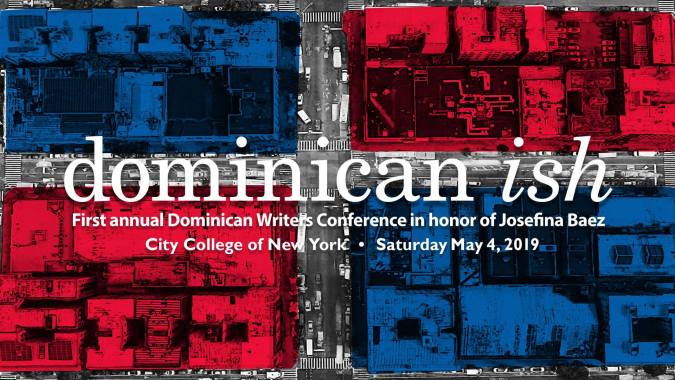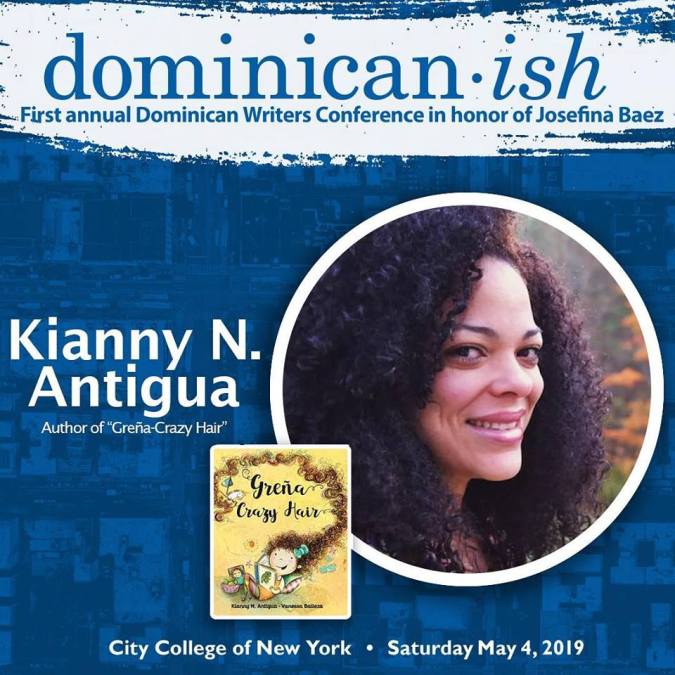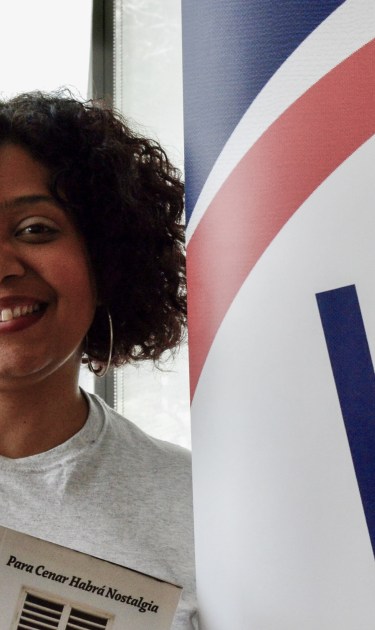Dominicanish. It’s how many people of Dominican heritage – those who have wondered if they’re Dominican enough – feel. The word is the central focus of an upcoming writers conference aimed at demystifying the publishing process for this community. Behind this new event is a group of powerhouse women, who hope to build community for writers who feel Dominicanish.
Inspired by Josefina Baez’s performance text, Dominicanish, the inaugural conference will honor the actress, writer, and director and will be aimed at those who live their lives between two cultures, who know what it’s like to be “ni de aquí, ni de allá.”
A group of eight writers put the Dominican Writers Conference together, but they quickly shouted out Angela Abreu, a Dominican American writer and founder of the Dominican Writers Association, as the driving force behind the May 4 conference. Abreu has long worked to create opportunities and community for writers, particularly Dominican Americans.
Though the conference is mainly focused on the Dominican diaspora, the organizers welcome writers of all backgrounds. And with nearly 30 workshops and panels, there’s something for everyone. The event will explore different genres and topics, such as nonfiction, fiction, memoir, essay, performance, arts, publishing, and media.
Some panels are more universal, like a workshop titled, “Calladita te Ves Más Bonita: Writing Rage” will help women write about their anger and unpopular opinions, or “Escribiendo en Español: Desde Santo Domingo a Nueva York” is a panel about the importance of maintaining our language in our writing. Others are more identity and genre specific, such as the panel about queer writers and discourse within the Dominican diaspora, a workshop for parents and caregivers to learn how to support their child’s writing, and the panel on how Dominicans are reshaping newsrooms.

The idea for the conference sprung last year when Abreu attended Dominican-centric events that remained secretive about the publishing process. Abreu wanted to ask people how they got their editor, who designed their book cover, and how they initiated the book-writing process. Instead, like many of her colleagues on the conference planning committee, she self-published after doing her own research.
This conference aims to do things differently, so that people can walk out of the event feeling like they know what next steps to take. By the end of the day, attendees will have information on the traditional path to publishing, which includes learning how to write a query letter and how to get their manuscripts reviewed.
One of the most important aspects of this event is the accessibility to industry professionals. Throughout the day, those in the literary world will do manuscript reviews through 15-minute sessions. These sessions often come with hefty price tags – upward of $200 – but the team worked with reviewers to get the price down to $45.
“They could be in the conference and meet their, who knows, they might be their future editor or future literary agent,” Abreu tells me.
As the other members of the planning committee mentioned, other spaces didn’t make room for poet-activist Yoseli Castillo’s bilingual work about her queerness, or for US-born Dominicans like Alicia Anabel Santos (founder of the New York Latina Writers Group), or for those from different backgrounds like writer and educator Peggy Robles-Alvarado, who’s Dominican and Puerto Rican. (This is the first time Robles-Alvarado has been invited to a Dominican space after continuously being deemed “not Dominican enough.”)
“It’s really important to highlight how much of a revolutionary and badass [Angie] is for creating this space for Dominican American writers,” Santos says. “Where she is saying, ‘You know what, fuck the establishment who are not allowing us to have a space where we are represented and visible, where our stories matter.'”

Embodying this spirit is keynote speaker Josefina Baez, most known for her performance texts Comrade, Bliss Ain’t Playing, Levente no. Yolayorkdominicanyork, and Dominicanish. Throughout her legacy of work, there’s a playfulness and intentionality about her use of language. And despite her pioneering work – or the fact that she takes her performances from theatre stages to parks to classrooms – she doesn’t get the recognition she deserves. As a matter of fact, in some circles, her 30-year oeuvre isn’t considered “real writing,” according to the advisory committee. Abreu previously invited Baez to an event for Dominican writers, but Josefina turned it down because the event organizers had previously made it clear that her work wasn’t valued in their space.
But Baez is “una tigerona,” and she has no qualms telling you how she feels and being herself unapologetically, Abreu says. Baez embodies everything that outside circles say shouldn’t be done in writing. She’s taught generations of writers there isn’t one way to write. Choosing Baez was like a “take this” to those who turned their backs on her work before.
“She should be a household name,” Robles-Alvarado says.“ … Whatever she’s bringing to that keynote speaker address, I know that it will encompass all of the work we’re trying to put up at the forefront.”
The conference will end in community, with attendants coming together for readings by Dique Dominican.
“I want people to walk away knowing that this is a conference where you’re empowered to believe that these stories you carry inside you are extremely valuable,” says Sydney Valerio, a writer and performer getting her MFA in the Creative Writing program at City College. “And no matter what way you decide, written or spoken, they need to be told.”
The Dominican Writers Conference takes place on Saturday, May 4, 2019 at City College of New York. Doors open at 9 a.m. (Registration is at 8:30 a.m.) Tickets are available online. General admission is $75, college students and senior citizens pay $25, and the event is free for high school students. The day’s itinerary can be found here.
Update, Thursday, May 2, 2019 at 4:50 p.m. ET: This story has been updated to clarify Abreu’s mission to help Dominican American writers.




